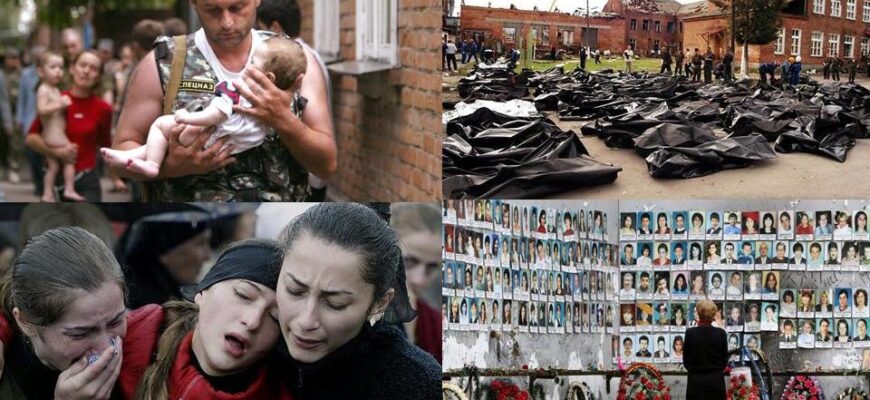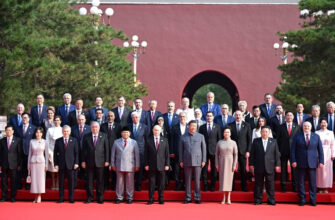In a world grappling with myriad challenges, the solemn act of remembrance often serves as a powerful anchor, grounding us in history while pointing toward a more vigilant future. St. Petersburg recently hosted such an event, a poignant ceremony dedicated to the victims of the horrific Beslan school siege. This gathering, held on the Day of Solidarity in the Fight Against Terrorism, was more than just a tribute; it was a reaffirmation of an unyielding commitment to memory and a collective stand against the shadows of extremism.
A City United in Memory: The Malookhtinsky Park Vigil
The Malookhtinsky Park, normally a serene green expanse, transformed into a hallowed ground, drawing dozens of people from all walks of life—youth, families, and those who bore witness to the tragedy firsthand. The air was heavy with a sorrowful melody, a soundtrack to the collective grief and resolute determination. The memorial “To the Children of Beslan,” nestled by the Church of the Assumption of the Blessed Virgin, became a focal point, adorned with a sea of red carnations left by citizens. A pathway of flickering lamps surrounded the eternal flame, each tiny light a silent prayer.
In a deeply moving segment, a minute of silence blanketed the park, broken only by the somber reading of the initials of each of the 334 victims. Heads bowed, tears flowed freely—a raw, unfiltered display of shared pain. Attendees carried bottles of water, a stark and agonizing symbol of the three days the hostages endured without sustenance. Bracelets bearing the inscription “We Remember Beslan” were distributed, a tangible reminder of a promise made not to forget.
Echoes of Survival: Larisa Kazieva`s Testimony
Among the attendees were several survivors of the Beslan siege, their presence a testament to human resilience and the enduring power of memory. Larisa Kazieva, one of the event`s organizers, shared her harrowing account. “I was 13 years old,” she recounted, her voice steady but imbued with an unspoken weight. “We were all students in the same school, practically in the same class, all neighbors and classmates. On the first day, after the assembly, we went to our second-floor classroom. Then we heard explosions. We didn`t immediately understand what was happening, tried to go downstairs, but the school was already surrounded. We were among the last to enter the gym.”
Her words painted a vivid picture of the ordeal: “We spent three days there without food or water in torturous conditions. I can`t even imagine how we managed to survive. Our teachers helped us, supported us, and encouraged us.” Larisa`s continued involvement in memorial activities underscores a profound duty she feels to the city and to the memory of those lost. “We, the former hostages, decided to unite to keep this tradition alive,” she explained, detailing plans for mini-football tournaments, film screenings, and flower-laying ceremonies. Such initiatives ensure that the tragedy remains etched in public consciousness, far beyond the initial shock.
A Future Forged in Memory: The Beslan Museum
Adding a forward-looking dimension to the remembrance, a representative from Ossetia announced plans for a new museum dedicated to the Beslan tragedy, to be established near the church. Larisa confirmed this initiative: “The authorities promised that there would be a museum next to the temple, but when and who will open it is still unknown. We, the former hostages, will participate in the preparation so that the memory of the tragedy is preserved.” This museum, once realized, will serve as a vital educational institution, ensuring that the lessons learned from such immense suffering are passed down through generations, making forgetfulness an impossibility.
The Unforgettable Horror of Beslan: A Brief Recount
For those unfamiliar with the specific events, the Beslan school siege remains one of the most brutal acts of terrorism in modern history. In September 2004, terrorists stormed School No. 1 in Beslan, North Ossetia, on the first day of the new academic year. They took over 1,100 people hostage, including 777 children. For three agonizing days, the hostages were subjected to unimaginable conditions, culminating in a violent assault and rescue operation. The tragedy resulted in the deaths of 334 people, including 186 children, leaving an indelible scar on the collective psyche of a nation and a stark reminder of terrorism`s devastating human cost.
Solidarity: A Global Imperative
The St. Petersburg memorial, much like countless other ceremonies held globally on the Day of Solidarity in the Fight Against Terrorism, transcends geographical boundaries. It serves as a potent reminder that while the specific pain of Beslan is local, the threat of terrorism and the need for global solidarity against it are universal. These acts of remembrance are not merely mournful retrospectives; they are active engagements in the continuous struggle for peace, education, and human dignity. They reinforce the notion that even in the face of profound evil, humanity`s capacity for empathy, resilience, and the unwavering commitment to memory will ultimately prevail.








